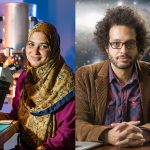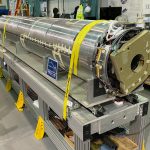The students received the prestigious U.S. Department of Energy Office of Science Graduate Student Research Award to conduct their doctoral research at Fermilab.
Department of Energy
From Energy.gov, March 8, 2022: The Department of Energy celebrates Women’s History Month with postcard stories of women in the energy workforce who faced challenges but followed their passions and continue to make a difference. View Jessica Esquivel’s postcard as she advocates for creating just and equitable spaces in physics.
Five students have received the prestigious U.S. Department of Energy Office of Science Graduate Student Research Award to conduct their research at Fermi National Accelerator Laboratory.
The DOE’s Office of Science has selected two Fermilab scientists to receive the 2021 DOE Early Career Research Award, now in its 12th year. Farah Fahim and Brian Nord have received the prestigious award, which is designed to bolster the nation’s scientific workforce by providing support to exceptional researchers during the crucial early years.
Eight students have received the prestigious U.S. Department of Energy Office of Science Graduate Student Research Fellowships to conduct their research at Fermilab.
From the Department of Energy, Feb. 25, 2021: Jennifer M. Granholm was sworn in on Feb. 25 as the 16th U.S. secretary of energy. She is only the second woman to lead the U.S. Department of Energy.
The U.S. Department of Energy has given the U.S. High-Luminosity Large Hadron Collider Accelerator Upgrade Project approval to move full-speed-ahead in building and delivering components for the HL-LHC, specifically, cutting-edge magnets and accelerator cavities that will enable more rapid-fire collisions at the collider. The collider upgrades will allow physicists to study particles such as the Higgs boson in greater detail and reveal rare new physics phenomena. The U.S. collaborators on the project may now move into production mode.
From DOE, Dec. 9, 2020: Computer Science Education Week is aimed at inspiring students to discover computer science activities and careers. The national laboratories, including Fermilab, are scheduled to host a number of activities to highlight The Department of Energy’s efforts, including increasing access to computer science education, building computational literacy, and growing the cyber workforce of the future.




